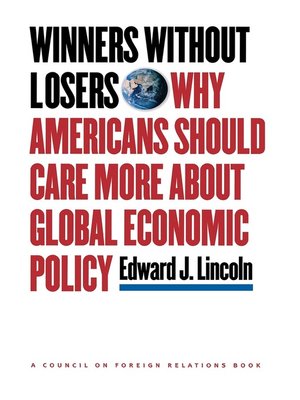Winners without Losers
ebook ∣ Why Americans Should Care More about Global Economic Policy · A Council on Foreign Relations Book
By Edward J. Lincoln

Sign up to save your library
With an OverDrive account, you can save your favorite libraries for at-a-glance information about availability. Find out more about OverDrive accounts.
Find this title in Libby, the library reading app by OverDrive.



Search for a digital library with this title
Title found at these libraries:
| Library Name | Distance |
|---|---|
| Loading... |
In the two decades since the United States became the world's only superpower, policymakers in Washington have seemingly abandoned many tools of statecraft and instead now rely on U.S. military strength as the key—and sometimes the sole—element of its global strategy. Yet economists see a world in which the salience of military power has been shrinking as greater affluence and deepening interdependence transform the global economy.
In Winners without Losers, Edward J. Lincoln, a highly regarded economist, contends that the best chance the United States has of ensuring peace and prosperity—for itself and for the rest of the world—will be found at conference tables rather than on the battlefield. Shining a spotlight on foreign trade policy as an agent for political change, this cogent and well-argued book urges policymakers, the business community, and citizens to find a path to increased stability by forging stronger international economic ties.
Interdependence is founded on cooperation with other nations, and in particular on multilateral institutions. Over the past five years, in particular, American policy has moved strongly away from cooperation and, in a single-minded pursuit of the "war against global terror," has largely ignored economic issues. Extending the scope of his previous work, which started with the economic transformations of postwar Japan and more recently considered the evolution of economic linkages and cooperation in East Asia, Lincoln applies regional lessons to the world stage. More than a critique of current policies, Winners without Losers argues for a transformation of American foreign policy that recognizes the new realities of the globalized world-realities that America's leaders ignore at the nation's peril.







